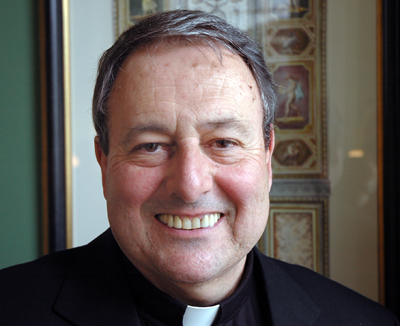
 I write this article as I participate in a special series of workshops for new bishops sponsored by the Vatican Congregation for Bishops in Rome.
I write this article as I participate in a special series of workshops for new bishops sponsored by the Vatican Congregation for Bishops in Rome.
Gathered at the Regina Apostolorum, the seminary for the Legionnaires of Christ, over 100 bishops from many parts of the world joined to discuss many issues which are a necessary part of the ministry of the bishop.
Each day we began with morning prayer and Mass, and under the direction of Cardinal Giovanni Battista Re, the prefect of the congregation, three or four presenters offered talks on various aspects of our ministry.
We began with the topic of Bishop as Teacher of the Faith (catechesis) and Leader of Prayer (liturgy). This first day was filled with discussions that were both “heavy” and inspiring, as I completed the day in a roundtable meeting with six of the 11 new American bishops in attendance.
We moved on to other topics as the days progressed, and certainly one of the most important was the bishop in relationship with his priests viewed as a high priority. As the principal co-workers with the bishop, it is critical that the relationship between them be strong, respectful and rooted in a holy unity of purpose in our common mission.
Included in this discussion was the topic very dear to my own heart, the promotion of priestly vocations and the care of seminarians, especially as we in the Diocese of Charleston struggle with the need for more priests.
We continued with the issues of ecumenism and interreligious dialog, care of the family, issues of bioethics and the social doctrine of the Church, and the participation of the laity in the life and mission of the Church.
I must say that one of the most engaging presentations was one by Archbishop Gianfranco Davasi on the topic of the relationship between the Bishop and Culture.
He offered all kinds of interesting and pertinent insights into the current disassociation of contemporary culture and religion, certainly evident in the western world, but also affecting the experience of people worldwide.
The Archbishop indicated that it is imperative and is an absolute necessity for the Church to enter into dialog with the many elements of culture: art, music, drama, literature, architecture, etc.
Today’s world reflects a real divorce between religious themes and aspirations and the contemporary culture. In fact, we see many indications of an antireligious sentiment in all of these cultural areas. The question is how do we respond?
Do we nostalgically seek to return to the past, ignoring the present, or do we forge ahead with manifold efforts to engage the culture with the hopeful goal of influencing it with the religious dimension so sorely needed and desired? These are serious questions for reflection.
Of course we dealt with the many administrative roles that a bishop must involve himself in as the leader of the local Church. Today’s world is quite complex with all the legal and financial questions facing us. And certainly, what I consider to be a most important element of these 10 days is the spiritual element of the life of a bishop.
Without a deep rootedness in prayer, especially animated by the Word of God in the Scriptures, none of the ministry of the bishop has any real hope of meaning and effectiveness.
It has been a wonderful experience and certainly being able to spend a lot of time with these bishops, especially the Americans, has been a real blessing.
We had three very special occasions. Sunday morning Mass in St. Peter’s Basilica which included some prayer time at the tomb of St. Peter as well as the tombs of Popes John Paul II, John Paul I, Paul VI and John XXIII. We were also able to tour the Sistine Chapel and the newly restored Pauline Chapel. This was perhaps the most moving experience of the week.
Secondly, we American bishops had the unexpected opportunity to meet with the new United States Ambassador to the Vatican, Miguel Diaz, and his family in their home. This, too was a great experience and it was wonderful to see a man who is a theologian occupy this position.
Thirdly, this very morning, Monday, we all traveled by bus to Castel Gandolfo for an audience with the Holy Father, Pope Benedict XVI. The Holy Father was very affirming and challenging in his address to us and the visit was a moving experience as well.
In our brief personal conversation, the Holy Father asked me to assure the people of South Carolina of his prayers for you and asked me to extend to you his blessing.
We end tomorrow and then I will spend a few days visiting the North American College, the American Seminary in Rome where Charleston has David Nerbun preparing for priesthood, and a few other Vatican offices that I need to consult with for diocesan business.
Blessings to you from Rome.
